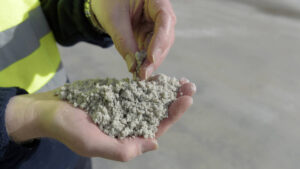Investors bail on lithium tiddler after drilling fails to impress

Pic: Bloomberg Creative / Bloomberg Creative Photos via Getty Images
Investors have sold out of ASX-listed lithium tiddler PepinNini Minerals after drilling results from its Pocitos lithium project in Argentina came in below expectations.
Shares in the stock (ASX:PNN) dropped as much as 33 per cent on Friday to an intraday low of 1.2c with 7.7 million shares changing hands by 1:30pm AEST.
The Adelaide-based company said historical data from its Pocitos lithium project in the Salta province of Argentina had indicated low to medium lithium brine grade potential for the project.
Earlier this year, geophysical surveys conducted over tenements held by PNN on three dried salt lakes highlighted potential for lithium brine bearing aquifers close to the surface with considerable thickness.
On the back of this news, drilling was conducted to confirm lithium grades and provide data for PNN who are targeting a defined lithium brine resource at the project within the next 12 months.
However, PNN revealed to today that drilling sample results at Pocitos came in lower than anticipated and didn’t meet the company’s expectations.
Meanwhile, PNN is planning to restart drilling next month on its Pular project in Argentina where samples indicate better-quality lithium brine grade potential than Pocitos.
“While the results at Pocitos are disappointing, drilling at Pular in September will still allow for pump testing and, depending on results, resource definition, in line with our target of declaring a Maiden Resource at the Salta Lithium Project by year-end, “ said PNN managing director Rebecca Holland-Kennedy.
The company is also undertaking geophysical surveys on its Rincon and Centenario projects to assess potential for lithium brine.
PNN was granted eight mining leases in Salta Province of north west Argentina covering 15,890 hectares over seven different salt lakes with the potential for Lithium Brine occurrences.
The company has continued to accumulate ground in the province and now holds 12 mining leases with continuous tenure of 26,355 hectares or 263.6km2.
Lithium brine
Lithium, a metal used in the production of rechargeable batteries for electric vehicles, is mined from three types of deposits: brines, pegmatites and sedimentary rocks.
Lithium brine deposits are found in salt lakes and play an important role in the world’s supply of lithium. In 2015, subsurface brines yielded about half of the world’s lithium production.
The biggest producers of lithium brines are in South America and include Chile and Argentina.
UNLOCK INSIGHTS
Discover the untold stories of emerging ASX stocks.
Daily news and expert analysis, it's free to subscribe.
By proceeding, you confirm you understand that we handle personal information in accordance with our Privacy Policy.








